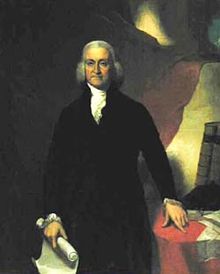One of my most enjoyable pastimes in researching the
American Revolution is discovering lesser-known figures whose role was crucial
in helping the Continental Army win against the King’s Army. Jonathan Trumbull
was one of these patriots.
Trumbull was the only Colonial governor to remain in office
throughout the war, and then win election as the governor of his state
following the Revolution. He served Connecticut for 15 years. Siding with the
Patriot cause, Trumbull is credited with supplying the Continental Army with
about 60% of the food and canons. Because of his efforts, Connecticut earned
the unofficial title of “The Provision State.”
A former business owner, Trumbull’s store in Lebanon,
Connecticut, became the War Office and a meeting place for the Council of
Safety. Dignitaries who visited there during the Revolution included a
veritable Who’s Who list of political and military dignitaries, including
George Washington, the Marquis de Lafayette, Benjamin Franklin, and cousins Sam
and John Adams.
Jonathan Trumbull’s family was among the first to settle in
the colony of Connecticut in 1705. Jonathan was born in 1710. As he grew, he
originally planned on becoming a minister. However, when his older brother was
lost at sea, Jonathan was recalled home from his studies at Harvard to help
with the family business.
He proved to be a successful businessman and his reputation
led to becoming a leader in his community. He was elected in 1733 to the
colonial general assembly. He also served as colonel in the Twelfth Connecticut
Regiment during the French and Indian War. He was elected state governor in
1769.
His wife, Faith Robinson, was a direct descendant of John and
Priscilla Alden who sailed to America aboard the Mayflower. Jonathan and Faith
had six children. One of their sons, John, became a famous early American
painter, best known for his depiction of the signing of the Declaration of
Independence.
 Jonathan Trumbull was unchallenged in his bid for the office
of Governor of Connecticut in 1775. In 1784, he decided not to run for another
term.
Jonathan Trumbull was unchallenged in his bid for the office
of Governor of Connecticut in 1775. In 1784, he decided not to run for another
term.
Trumbull spent his retirement studying theology. He died of
a stroke on this day in history, August 17, 1785.
In 1934, The Daughters of the American Revolution purchased
Trumbull’s Lebanon home and his store (the “War Office”) and have operated both
as a museum ever since. They are open to the public but are currently under
restoration, and closed for the 2016 season.
For further information, visit here.
The Connecticut Historical Society has collections of his
personal and business letters, including correspondence with George Washington
and Benedict Arnold.


This is great Elaine! What a rich history America has and so much of it goes unnoticed...I love that you research and share about these lesser-known figures involved in the American Revolution. That is one of the reasons I love CQ, I have learned so much about our country. Thank you for sharing.
ReplyDeleteBlessings,Tina
You are very welcome, Mrs. Tina! I am learning right along with the readers! Thanks for commenting. :)
DeleteThis is interesting! I'd heard of Trumbull but wasn't aware of all these details. Thanks so much for sharing, Elaine. Have a great weekend! :)
ReplyDeleteThank you, Karen! I think I was more familiar with his son who was the painter. I learned more history while researching this blog. :) Hope you have a great weekend as well!
DeleteThis is a fascinating post, Elaine. Thanks for sharing about Jonathan Trumbull and his connections to other notable Americans.
ReplyDeleteIt was so interesting studying this man's history! If I'm ever in Connecticut, I'd love to visit the Historical Society and read his correspondence! Thanks for commenting, Janet!
DeleteThat's quite interesting! CT had such a perfect placement as a cornerstone in the revolution. It would probably been a different outcome if CT and Trumball had fought as hard for the crown!
ReplyDeleteYou are probably right, Debra! With New York being such a Loyalist stronghold, it was almost a necessity for the Patriots to have strong backing in its neighboring state or, like you said, there might have been a different outcome! Thought provoking. Thanks for commenting.
Delete